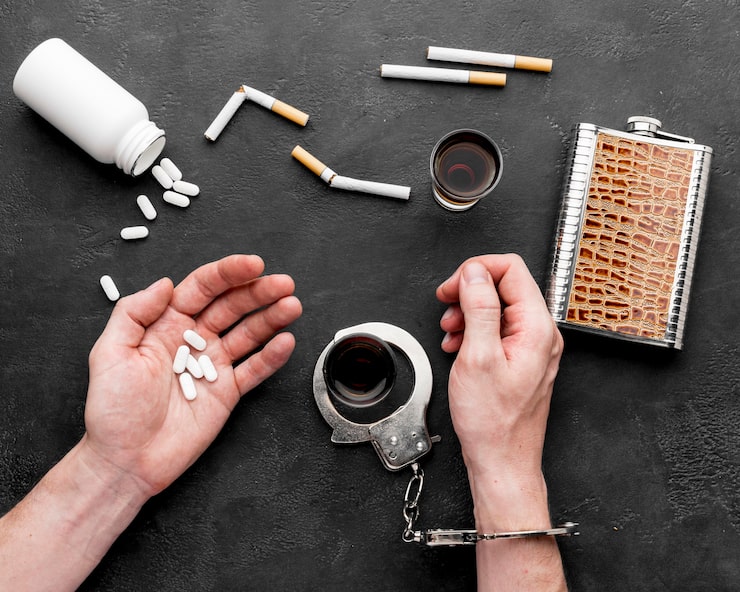The moment you drink alcohol, smoke, take a pill, or inject any substance, you’re putting foreign chemicals into your body—and you usually know that some of them can be dangerous. In the heat of the moment, it may feel like the right choice, especially if it helps you feel better, get high, or fit in. If you haven’t realized it yet, know this: using addictive substances puts your health—and your life—at risk.
More than seven million people now suffer from drug abuse, and one in four deaths is linked to it. Health experts tie drug use to more disabilities, illnesses, and deaths than many other conditions. People misusing drugs are also more likely to be involved in accidents, domestic violence, and unintentional injuries. (1)
So how exactly do drugs damage the body and sometimes lead to death?

How drugs affect the body
In short, drugs change how your body normally works. Even substances thought to be helpful—like marijuana—or prescription drugs such as Adderall can cause harm. Regular use of addictive substances puts both your physical and mental health at risk.
Drug abuse can increase the chance of respiratory problems, coma, stroke, heart attack, blood disorders, panic attacks, and more. It can leave you looking tired and malnourished and weaken your immune system.
Some studies show people who don’t get treatment for addiction may lose 15 to 20 years of life. If you begin using at 18 and never seek help from a reputable rehab center like Heal Behavioral Health, you might not live past 40. (2)
Unfortunately, only about 14% of adults with substance use issues received treatment in the past year. That number is far too low given the risks. It’s still possible to get help—admitting you have a problem early gives you the best chance to recover and rebuild your life. (1)
Health impacts of substance addiction
Addiction can cause a wide range of short- and long-term health problems. What happens depends on the drug, how often it’s used, and how much is taken. Drug dependency can affect almost every organ in the body. (3)
Here are some common effects of substance addiction:
Brain function decline
The brain rewards things that feel good, encouraging you to repeat them—this includes activities like eating and exercising. Addictive drugs hijack the brain’s pleasure centers. With regular use, your brain adapts and may rewire itself, making it harder to feel pleasure without the drug. Over time, you may need larger doses to get the same effect.
This dependence also makes quitting tough; withdrawal can be painful and hard to manage. Still, treatment can help you cope with withdrawal and overcome addiction.
Long-term use can harm brain function—causing memory loss, poor judgment, learning difficulties, and other cognitive problems. Some drugs have specific, serious effects: alcohol raises the risk of dementia, inhalants can rapidly damage brain cells, and marijuana may cause short-term memory loss. (2)
Higher risk of heart and kidney disease
Drugs can harm any organ, but the heart deserves special attention. Substance use can cause an irregular heartbeat, heart attacks, and other cardiac problems. Injecting drugs can also collapse veins and cause bacterial infections in heart valves and blood vessels.
Drugs that affect the heart include:
– Marijuana
– Inhalants
– Methamphetamine
– Steroids
– Cocaine
– Heroin (4)
Psychoactive substances like MDMA (ecstasy) can disrupt the body’s temperature control, leading to dangerous overheating, severe dehydration, and long-term kidney damage or failure.
Increased cancer risk
Smoking any substance, including marijuana or tobacco, is linked to cancers of the mouth, throat, stomach, and lungs. Secondhand smoke also raises the risk of lung cancer and other health problems. Quitting smoking and following safe detox practices can help reduce these risks.
Harm to the fetus
Drug use during pregnancy is dangerous for both the mother and the baby. Many drugs contain toxic chemicals that can harm an unborn child. Pregnant women who use drugs may also engage in risky behaviors and neglect nutrition, making harm more likely.
Drug use during pregnancy can lead to premature birth, birth defects, and long-term behavioral and learning problems in the child.
Takeaway
Substance addiction causes serious health problems. Drugs can change how your brain works, leading to mood swings and poor judgment. They can do lasting damage to the heart and kidneys and increase cancer risk. Pregnant women should avoid illicit drugs to protect themselves and their babies.
It’s not too late to make a change. If you or someone you know is struggling, admit the problem and seek medical help as soon as possible.
References
“Effects of Drug Abuse and Addiction,” Gateway Foundation: https://www.gatewayfoundation.org/faqs/effects-of-drug-abuse/
“What Do Drugs Really Do to Your Body?” Turnbridge: https://www.turnbridge.com/news-events/latest-articles/what-do-drugs-do-to-your-body/#
“Health Care Systems and Substance Use Disorders,” NCBI: https://www.ncbi.nlm.nih.gov/books/NBK424848/